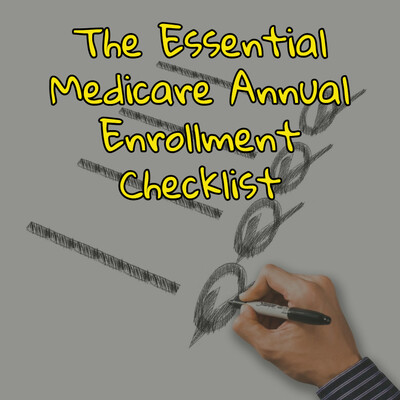
The Essential Medicare Annual Enrollment Checklist: Your Guide to Making Informed Healthcare Decisions
Making informed decisions about our healthcare is becoming increasingly important. With Medicare being such a vital aspect of medical coverage for seniors, taking the time to carefully review and evaluate your options during the annual enrollment period is crucial. In this article, we will present you with an extensive and comprehensive checklist that will help guide you through this process in a friendly and informative manner. By following this checklist, you can help ensure that you are making wise choices when selecting your healthcare plans for the upcoming year. So let's delve into the details and equip ourselves with everything we need to know to confidently navigate the Medicare annual enrollment!
Understanding the Medicare Annual Enrollment Period: Dates and Deadlines
Dates to Remember:
- The Medicare Annual Enrollment Period (AEP) runs from October 15th through December 7th each year.
- During this time, you have the opportunity to make changes to your Medicare coverage for the following year.
What Can You Do during AEP?
During the Annual Enrollment Period, you can do the following:
- Switch from Original Medicare to a Medicare Advantage Plan or vice versa.
- If you switch to Original Medicare, you can apply to purchase a Medicare Supplement Plan, but be aware that in most states, the insurance company isn't required to accept you if you have medical conditions.
- Change from one Medicare Advantage Plan to another.
- Enroll in, or change your Part D prescription drug plan.
Remember that any changes made during AEP will take effect on January 1st of the following year. Taking advantage of this window of opportunity is essential, as there are limited exceptions outside of AEP when changes can be made.
Exploring Different Medicare Plan Options: Advantage, Supplement, or Original?
When choosing a Medicare plan during the annual enrollment period, there are three main options to consider: Advantage plans, Supplement plans with Original Medicare. and Prescription Drug Plans.
Advantage plans (Part C) offer all-in-one coverage that includes Parts A and B, often including additional benefits like prescription drug coverage. Private insurance companies provide these plans and may have lower monthly premiums than other options.
Medicare Supplement plans (Medigap policies) work with Original Medicare to cover some of the costs associated with Parts A and B. These policies can help reduce copayments, deductibles, and coinsurance amounts.
Original Medicare is a fee-for-service federal government-run program that includes Part A for hospital stays and Part B for medical services. While it doesn't provide complete coverage, many people pair it with a Medigap policy for more comprehensive benefits.
Prescription Drug plans help people cover their prescriptions. They are run by private insurance companies but are considered part of Medicare.
Understanding these different plan options will help you make an informed decision about your healthcare needs during the annual enrollment period. Consider factors such as cost, provider networks, prescription drug coverage, and any specific medical conditions you may have when comparing these options.
Assessing Prescription Drug Coverage: Determining Your Medication Needs
Determining your medication needs is a crucial step in assessing prescription drug coverage. Make a list of all the medicines you currently take, including dosage and frequency. This will help you understand which drugs are covered and at what cost under different Medicare plans.
Consider factors such as whether your medications are brand-name or generic and if there are any restrictions on the amount or duration of coverage for each drug. It's also important to note if you require specialized medications that may not be readily available or covered by specific plans.
Evaluate how frequently you visit the doctor for medication adjustments or refills, as this can affect your overall prescription drug costs throughout the year. Additionally, identify any upcoming surgeries or medical procedures that might require new prescriptions.
By thoroughly assessing your medication needs, you can choose a Medicare plan that provides adequate coverage while minimizing out-of-pocket expenses.
Evaluating Your Current Medicare Coverage: Assessing Your Needs
Take stock of your current healthcare needs and compare them to your existing coverage.
- Start by reviewing the benefits and services your current Medicare plan offers.
- Consider if these benefits align with your specific healthcare needs.
- Evaluate any gaps in prescription drug coverage, specialists, or other medical services you require.
Identify any health status or lifestyle changes that may impact your coverage needs.
- Have there been any new diagnoses this past year? Any changes in medication? Think about how these factors might affect what you need from a Medicare plan moving forward.
- If you recently retired, moved to a different location, or experienced significant life events like getting married or divorced, consider how these changes could influence the type of healthcare coverage that would benefit you now or in the future.
Determine whether it's time to explore other options for better-suited plans:
- If you find limitations within your current plan that don't meet all aspects of your healthcare requirements, exploring alternative programs available during the Annual Enrollment Period (AEP) might be worthwhile.
- Take advantage of resources like online tools and insurance agents who can help assess whether a different Medicare plan would better suit your needs.
Comparing Medicare Plans: Key Factors to Consider
When comparing Medicare plans, consider these key factors to help you make an informed healthcare decision:
- Coverage: Look closely at what each plan covers and whether it includes the services and medications you need. Consider any potential changes in your health needs in the coming year.
- Costs: Compare monthly premiums, deductibles, copayments, and coinsurance for each plan. Calculate your expected out-of-pocket costs to determine which program offers the best value for your specific situation.
- Network: Check if your preferred doctors, hospitals, and specialists are included in a plan's network of providers or if you can see out-of-network providers for an additional cost. There are no networks if you choose original Medicare with a Medigap plan, so you can see any provider who accepts original Medicare.
- Prescription drugs: If you take prescription medications regularly, review each plan's formulary (list of covered drugs). Ensure your prescriptions are covered, and check for any restrictions or prior authorization requirements. But if you don't take any medications, it doesn't mean you shouldn't have a plan. Medicare imposes a lifetime penalty that builds up every year for people who do not enroll in a drug plan.
- Ratings: Consult resources like Medicare.gov (or ask your broker) to find the Medicare Advantage ratings. They are star-rated based on quality measures such as customer satisfaction and performance outcomes. Medicare supplement plans don't have star ratings, but the insurance companies that provide them have financial strength ratings.
By considering these factors when comparing Medicare plans during annual enrollment periods or when selecting a new policy outside this timeframe, you can ensure that you choose a plan that meets both your healthcare needs and financial goals while providing peace of mind for the upcoming year.
Calculating Costs: Budgeting for Medicare Expenses
Before enrolling in Medicare, it's essential to understand the potential costs associated with your healthcare. By budgeting for these expenses, you can ensure that you're financially prepared and able to receive the care you need. Here are a few key factors to consider:
- Premiums: This is the monthly amount you pay for your Medicare coverage. Your premium will vary depending on factors such as which parts of Medicare you choose and your income level. However, most people in 2023 got Part A for free and paid $164.90 per month for Part B.
- Deductibles: A deductible is the amount you must pay out-of-pocket before your Medicare coverage kicks in. These amounts can vary between different parts of Medicare, so it's crucial to remember them when planning your budget.
- Copayments and Coinsurance: In addition to premiums and deductibles, there may be copayments or coinsurance fees that you're responsible for when receiving healthcare services. These can add up quickly, so it's essential to anticipate them when calculating your overall healthcare expenses.
By taking the time to assess these potential costs upfront, you'll have a clearer understanding of how much money you'll need each month for your healthcare needs throughout the year. Remember: proper financial planning will help alleviate any surprise expenses down the line!
Making an Informed Decision: Tips for Selecting the Right Medicare Plan
Tips for Selecting the Right Medicare Plan
When it comes to choosing a Medicare plan, there are a few key tips that can help you make an informed decision. Firstly, take the time to review your healthcare needs and consider any changes since last year. This will give you a clearer understanding of what type of coverage you require.
Next, compare different plans to find one that meets your specific needs and budget. Look at factors such as premiums, deductibles, co-pays, and prescription drug coverage. Understanding the network of doctors and hospitals available under each plan is also important.
Lastly, don't be afraid to seek expert assistance who can provide objective information about Medicare plans. The member agents at CertifiedMedicareAgents.com can help you find the right plan for you. Agents often have tools that the general public doesn't have access to. These tools can help simplify decision-making by providing side-by-side comparisons and personalized recommendations based on your circumstances.
Selecting the right Medicare plan requires careful consideration of your healthcare needs, comparing various options available in terms of cost and coverage, and utilizing helpful resources for guidance. Go to https://CertifiedMedicareAgents.com to get free help.




